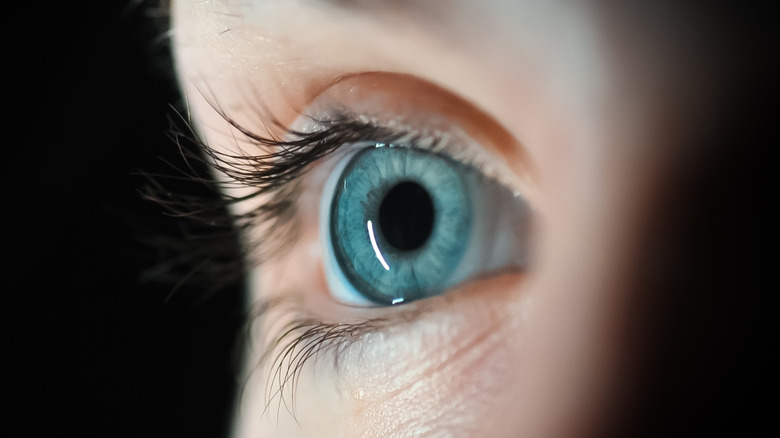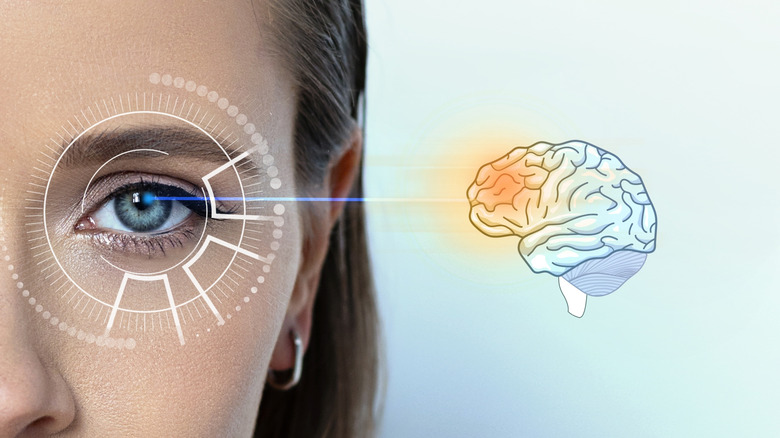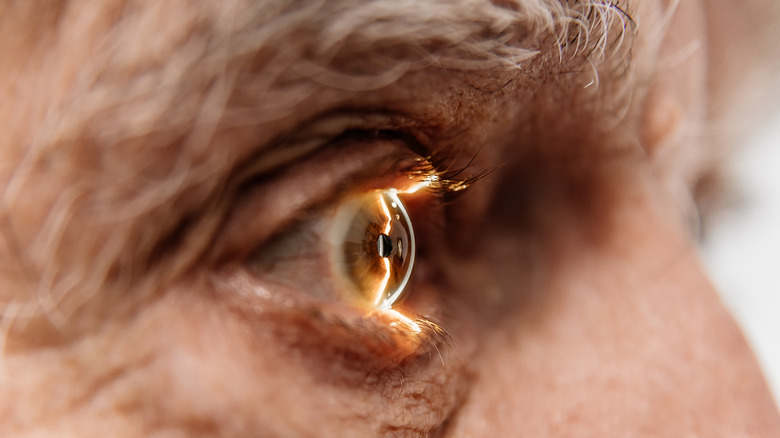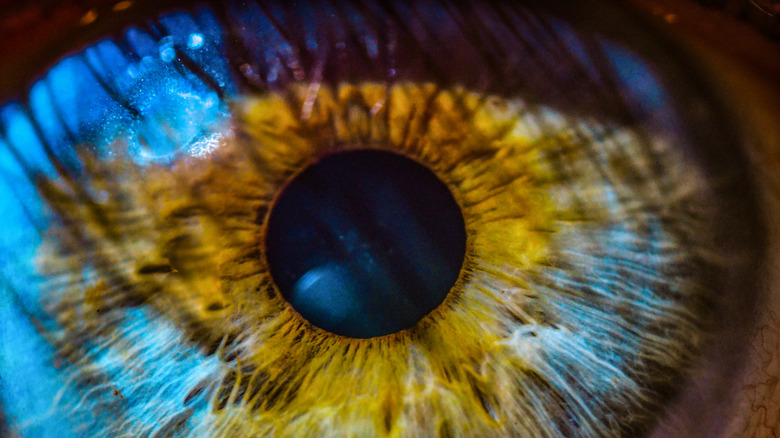If You've Ever Felt Like Someone's Watching You, Here's Why
As far as we've come in terms of scientific progress, there are some truly inexplicable parts of the human experience. Acquired savant syndrome, for example, whereby somebody attains seemingly superhuman abilities such as precise memory recall following some sort of traumatic event, remains a mystery that scientists can't explain. But even those of us who don't find ourselves suddenly able to speak a foreign language can still have inexplicable experiences.
There are, for instance, several potential explanations for déjà vu, but there is no universally agreed upon solution for this oddly unnerving experience — though scientists suspect it has something to do with the way we might sometimes feel like we're psychic. Likewise, the feeling of being watched even when we can't see the person doing the watching is an extremely strange phenomenon. But unlike many other seemingly unsolvable mysteries, investigating this bizarre sensation reveals some fascinating insights into how our brains work.
How our brain interprets visual data
Known as "gaze detection" or "gaze perception," the ability to feel as if we're being watched without looking directly at the person doing the watching is actually an important part of our evolutionary history. But if we can't consciously see something looking our way, how are we able to register its gaze?
We perceive the world visually via a process that involves light hitting a layer of tissue in the back of our eye called the retina. Cells known as photoreceptors convert that light into electrical signals which are transferred to the brain — the most important organ that works with our eyes — via the optic nerve. But rather than simply traveling to one area of our brains, these signals reach multiple regions. The visual cortex, which sits at the back of the brain, is the most important of these since it is responsible for producing our conscious vision of the world, turning the electrical signals into images. Other areas of our brains are, however, also processing these signals, and it turns out these processes can take place even when our visual cortex isn't working and we're not consciously "seeing" the world.
A 1974 study published in the journal Brain focused on a patient whose visual cortex had been damaged, leaving him cortically blind yet still able to respond visual events. Researchers found that even though the patient had no conventional sight, he was able to accurately reach for and react to visual stimuli, could differentiate between a vertical, horizontal, and diagonal line, and could tell the letters "X" and "O" apart. This suggested that visual capacity can remain even after damage to the visual cortex, leading author Lawrence Weiskrantz to coin the term "blind sight." It's this "blind sight" that plays a role in our ability to feel as if we're being watched without "seeing" the person doing the watching.
Our brains register being seen, even when we don't notice
As more research has been carried out, it has become more and more evident that our visual cortex isn't the only part of our brains that can process visual input. In 2013, researchers looked at cortically blind patients (i.e., those whose visual cortices had been destroyed) with no conscious vision but who showed activity in the amygdala when confronted with facial or bodily expressions of emotion. A team from Geneva University Hospital in Switzerland published a study in The Journal of Neuroscience investigating whether a cortically blind participant could also detect the direction of gaze.
The patient, whose visual cortex had been destroyed, was examined using fMRI techniques while being presented with faces that were either looking towards or away from him. The researchers noted increased right amygdala activity in response to direct gaze as opposed to when the gaze was diverted away from the patient. What's more, the team was able to link this amygdala activity to a larger network in the brain which is associated with face and gaze processing. The study showed that intact conscious vision via the visual cortex wasn't necessary for the human brain to register visual events of this sort, even if the person themselves wasn't consciously aware of their brain's reaction to the visual stimuli.
This suggests that "blind sight" as Weiskrantz originally dubbed it, might play a role in our ability to feel that we're being watched, without even consciously seeing the watcher's face. Specifically, the Geneva University Hospital study showed that human beings are at least capable of registering when people are watching us as long as they're in our field of view, even if they happen to be in the corner of our eye and we haven't consciously noticed their gaze via our visual cortex.
We're predisposed to assume people are looking at us
The idea that our brains are able to register visual input even when our visual cortices are compromised is fascinating, but not exactly unbelievable. As long as you know how vision works in terms of the electrical signal's pathway to the brain, it's not all that shocking to learn that various areas of our brain process the information besides the visual cortex. But what about that feeling of being watched when there is absolutely no visual indication at all. It's here that things start to get a little more nebulous.
A 2013 study published in Current Biology found that when human beings are uncertain as to whether another individual is looking at them, such as at night or when the other person is wearing sunglasses, they are much more likely to perceive the watcher as looking directly at them. Participants were shown faces, some of which had "noise" added to their eyes to obscure the direction of their gaze. The researchers found that all participants systematically perceived these noisy gazes as being directed toward them. In other words, it seems we all have a predisposition towards assuming people are looking at us even when we're not sure.
That might explain this feeling of being watched when we can't see the direction that somebody might be looking. But what about instances where we feel as if we're being watched even when we're not sure that somebody is there?
Do we really 'feel' when someone is watching us?
It turns out there has been some research into the particularly strange phenomenon of "feeling" as if we're being watched. Richard J. Wiseman, professor of the public understanding of psychology at the University of Hertfordshire in the U.K., carried out studies to ascertain whether there was any evidence at all for our ability to know when we're being stared at even without seeing the person doing the staring, which would indicate some sort of extra-sensory ability. While there are some that claim as much, there's no conclusive science to back up such a claim.
Wiseman and his team attempted to gain some such evidence in their studies, wherein they placed two people in separate rooms. The first person, dubbed the "experimenter" was given access to a one-way closed-circuit television system, allowing them to look at the other participant. The experimenter would then "stare" at the participant on and off while the researchers tracked electrodermal activity (EDA — changes in the skin's electrical conductivity) in the participant. The results for one group showed that the EDA of the participants did not change significantly when they were being watched. Another group, however, did show significantly higher EDA when being watched. Wiseman and his team weren't able to offer any explanation as to why the second group exhibited this apparent ability to detect when they were being watched.
Writing for the BBC, cognitive neuroscientist Christian Jarrett offers a simple explanation for feeling as though we're able to "feel" when someone is watching us, suggesting we simply remember when we've felt as though we're being watched only to turn around and find someone actually watching us, and forget when we turn and nobody is there. In other words, if we've ever felt like we're being watched and it turns out to be true, that reinforces our sense that we "knew" somebody was looking at us.




